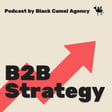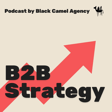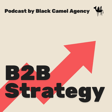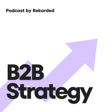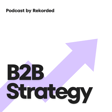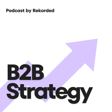Become a Creator today!Start creating today - Share your story with the world!
Start for free
00:00:00
00:00:01

06: How Nick Bennett Generated $1.2M From LinkedIn
Without even talking about the company he worked for, Alyce, Nick Bennett drove $2M in pipeline with a 60% close rate. How can you replicate his strategy? How should B2B companies create a LinkedIn evangelist program?
Transcript
Meet Nick Bennett: LinkedIn and B2B Influence
00:00:00
Speaker
Welcome to the B2B strategy podcast, your round table of B2B strategist guiding you and every decision you make in growing your business. Today we'll be talking to Nick Bennett. Nick is most known for being the host of the anonymous marketer podcast, and he is currently writing his book, B2B influencer marketing, how the creator first economy is transforming marketing. In this episode, we're going deep into how to create a LinkedIn evangelism strategy, as well as an influencer marketing strategy for B2B.
00:00:25
Speaker
Last week you wrote a post on LinkedIn. Two million dollars in pipeline in two years where 60% was closed. That's 1.2 million in revenue with a customer acquisition cost of zero or only your salary. But you never talked about the company and still produce those numbers organically.
00:00:43
Speaker
Nick, would you be able to walk us through how you were able to achieve those kinds of results? Yeah, you know, it wasn't easy.
LinkedIn Success Without Direct Promotion
00:00:49
Speaker
It was more of just showing up every single day. Like for me, I've always been posting on LinkedIn. And so it's been a journey that I've been on for the last three and a half years.
00:00:58
Speaker
So Alice, which is where this company, where this happened, they were able to take advantage of that because I was probably about a year and a half into my journey when I started working there. So I've already built a decent foundation. I was still talking about things that were important to me. The beauty is that whenever I post the amount of people that click my profile, we're able to see where I worked. And so I didn't have to talk about the company. It was more about just getting the eyeballs on it.
The Role of Dark Social in Marketing
00:01:27
Speaker
Ultimately, more people would see where you work. They end up on the website. Maybe they attend an event of yours. They submit an inbound demo request. And it happens like that. And another piece of that is it was just dark social or whatever they call it. It's like they were talking in communities and things that popped up like that. People were like, hey, I love your content. What do you do for work? And when I would tell them, they'd be like, oh, actually, hey, I do have a need because I use a competitor of yours.
00:01:54
Speaker
Could you tell me how you differentiate from XYZ? So it was more just putting yourself out there and showing up consistently every single day. Yeah, I think one big thing that people forget with LinkedIn content is that it's not just content. That's only one side of the equation. The profile is the second part, which is kind of capturing all the demand that you're creating or the trust or whatever.
00:02:16
Speaker
Um, so everyone needs to optimize that. But do you think that if you did talk more about the company and you were a little bit more intentional about that, do you think you were, you would be able to get better results? I don't think so. I mean, maybe it's who knows, but I feel like it becomes self-promotional to a certain degree. And like, that was always something that I didn't want to do. Like I didn't want to be the person that was like,
00:02:37
Speaker
Hey, go check out this event or this webinar. Go do this. Hey, we launched a new feature. Go buy it because I said so. I want you to make that decision on your own. I want you to just know or at least let us into
People-First Marketing Approach
00:02:51
Speaker
the conversation. At the end of the day, the product still has to hold up on its own and you have to make that decision based on what you want. But I don't know.
00:02:59
Speaker
I always see these people that are constantly talking about their companies and I'm just like, I have no interest in that. It doesn't teach me anything personally. There was no value add. So that's why I was like, if I talk about the company, is it going to really be a value add for my audience or can I just continue to talk about what I talk about? And I will rely on the people that click my profile and hopefully come across the company based on that.
00:03:23
Speaker
Yeah, yeah, I think value is absolutely key. And I think when someone too many, especially B2B companies are just straight selling, and that's just a huge problem. I think that there is a way to give value and kind of funnel it down in a way where you can be intentional about it. But it seems like you have more of a relationship centric approach to it. I mean, you talk about relationships all the time. So people were more likely to figure out how your company could help them.
00:03:49
Speaker
because you had that relationship with them. 100 cents. It's the whole idea of people first go to market. Ultimately, you're putting your people first both internally and working with people externally. But think about if your company has 10 people that are like myself that are creating content and the amount of impressions and views that it would see. And think about how much you could save in paid ad spend or search because you create
00:04:17
Speaker
the people and empower them to talk about what is passionate to them. The company benefits because obviously you work there, but you're not going to work there forever. So it's kind of like a win-win. The company benefits while you're there. The person benefits because they're building their own brand. Ultimately, they're going to hopefully flourish and go off and do their own thing as well.
00:04:35
Speaker
Yeah, and I think that with as time goes on and people are more becoming more opposed to even looking at an ad. This is ad free and people are going to simply be more likely to look at whatever you're posting about on top of saving all that.
00:04:51
Speaker
impression, add money. So how do you think that this kind of strategy could be repeated by B2B companies?
Employee Advocacy and Content Creation
00:04:58
Speaker
Do you think there's like a specific step by step kind of evangelist strategy? I don't know. I feel like I should kind of build one to be honest with you. Like, I feel like I feel like there's there needs to be like some type of like worksheet or something that is out there. Now we did develop like a people first go to market workbook that
00:05:17
Speaker
I mean, it doesn't go to LinkedIn specifically. It goes into more of the overarching piece, but I think it's similar. I don't want to say it's employee advocacy, but it kind of is employee advocacy to a certain degree because you need someone that is an SME and subject matter expert around creating content on social media already.
00:05:37
Speaker
If they can teach additional people within the company why that's important and showcase that, and maybe you gamify it, maybe you create a leaderboard, maybe you make it fun, maybe you create a Slack channel where people can jump in and brainstorm together or ask those questions that they feel is dumb or something, or they don't want people to be like,
00:05:57
Speaker
Can you take a look at this content? I don't want people to think about me in the wrong way. It's employee advocacy at the center of it, but it rolls up to that people first mindset, but you just have to have someone that's going to like, man,
00:06:12
Speaker
like this specific program to be able to have it be successful.
Overcoming Challenges in LinkedIn Strategies
00:06:16
Speaker
Is there something that you have seen talking with others that there's an objection to implementing this at a company? What are preventing B2B companies from taking more advantage of LinkedIn?
00:06:28
Speaker
They don't want to make their employees required to be able to do this. And I know there's some software out there that will allow you to basically like just click share or repost or whatever. But again, that adds no value to anyone's feet at the end of the day. I think the biggest thing is imposter syndrome. People don't want to sign up for something like this because they don't want to be judged by
00:06:50
Speaker
the content that they create. And I mean, that's just that's part of the game. Unfortunately, it's like everyone has imposter syndrome, like I have imposter syndrome. And I've been doing this for years. And it's like, you have to realize that as soon as you hit post, there's always going to be someone that doesn't agree with the content that you put out there. And that's okay, because
00:07:08
Speaker
Your content isn't for everyone. Your content is for who you want it to be for, and don't change who you are because of that. But a lot of people can't wrap their head around that specific piece. And I think that's why a lot of people don't want to buy into a program like this. But if you have someone that you could show as a success story of how successful this has been and why,
00:07:32
Speaker
someone might be more willing to take a look at it versus a company saying, hey, we need to do this. There are certain companies that you think are doing this well, LinkedIn evangelism. Well, yeah, I mean, lavender. Perfect example. I feel like hockey stack is another really good example. I feel like I mean, Gong was really strong at it when a lot of people were there. I feel like they've kind of shifted a little bit. But
00:07:58
Speaker
It's the people that are already at these companies that are kind of like creating content because you don't follow these brands for the brand and the content they put out, you follow these brands with people that work there. And so like when I think of like Lavender, like, yeah, cool company, everyone knows who Lavender does, but I think of people like Jen and Todd and Will, because they're the ones that ultimately are creating content. And same for hockey stack, I mean, they've got
00:08:24
Speaker
And I feel like both of them just released like a media kind of like their own media channel as well. And it's like, it's super interesting to see like, I feel like you have the base level evangelism, which is like, you know, LinkedIn content, stuff like that. Then you take it to like an owned media perspective. And I feel like that increases like, that increases a huge amount. And yeah, like hockey stack and lavender own these, but it's still the people that are creating the content that work there.
00:08:52
Speaker
Is there a big misconception that people have when implementing that kind of strategy, not just LinkedIn, but also the only media and just the whole aspect of building relationships and building the trust?
Leveraging Relationships on LinkedIn
00:09:05
Speaker
I think that people just, you know, they, they, they misguide themselves on like, what do they actually want to get from this, like executives will be like, well, like, hey, go post on LinkedIn, because you're going to drive more leads, like, that shouldn't be
00:09:17
Speaker
why you're posting on LinkedIn, you should be posting on LinkedIn to build relationships because it's a social media network at the end of the day. It's not one sided. And that mindset is very transactional. When you think about it on the flip side, like again, going back to people first, it's like very relationship driven. And I feel like LinkedIn and any other social media platform, it's all about the relationships that you build on these platforms to the content that you create. And that should be the biggest thing. But executives have the bottom mind.
00:09:47
Speaker
like in their mind of like, all right, well, we just have to hit revenue numbers or whatever. Like, is this going to, is posting on LinkedIn gonna impact revenue numbers? But if I can go show, hey, I drove $2 million and 60% of that close, I would love for any executive to show me like, hey, that wasn't worth the investment because I have not met one yet.
00:10:09
Speaker
Yeah, all about showing the results from it. What you said about LinkedIn and all social media just needing to build relationships, I think it matters even more for LinkedIn, simply because the algorithm is based on your network, whereas TikTok, Instagram, that's all interest-based. So for Instagram and TikTok, I mean, relationships are important, but it's a lot easier to simply put out content
00:10:39
Speaker
because it gets shown to people that are simply interested in this whatever topic you're posting about. Whereas with LinkedIn, it doesn't show that to people. It shows it based off of people in your network interacting with your content. And so that you can see the people that are making the best out of LinkedIn have relationships through LinkedIn. So I 100% agree about that.
00:11:05
Speaker
You're currently writing a book called B2B Influencer Marketing, How the Creator First Economy is Transforming Marketing.
B2B Influencer Marketing Insights
00:11:13
Speaker
If companies don't have the subject matter experts with the capacity to have evangelists from their own company, how can B2B companies use influencer marketing in a similar approach?
00:11:24
Speaker
Yeah, I think it's something where there was a recent survey that said 88% of B2B companies in 2023 want to test influencer marketing. So it's top of mind for a lot of companies in B2B. The issue is many don't know how to structure, how to find people to work with.
00:11:44
Speaker
When they think of influencer marketing, they think of B2C. And B2C has figured this out. In B2B, it's not like you can just go sign up for a platform and find people that you want to work with because that doesn't really exist. People that I know have tried to build it, but there was really no way to monetize it to a certain degree and it was very hard. Now, I think that you have to figure out what are the outcomes that you actually want to achieve by using influencer marketing. And it can't be one-sided. You can't be like, all right, hey, go do the sponsored post on LinkedIn.
00:12:13
Speaker
Cool. All right. If I go do a sponsored post on LinkedIn, I do the posts. What happens? You're going to measure your entire strategy or if this works or not off of one post. I think it's the wrong mindset. I think that you have to figure out how to tie it into your larger strategy and that you have to try to figure out how
00:12:32
Speaker
Working with a creator influencer is one part of the strategy. It's, you know, how do you develop additional media assets and content out of that? How do you work around an email marketing strategy or direct mail strategy or all these other pieces around, you know, paid? If you're doing paid, it can't just be like, all right, we're going to go do this post. Like you have to think of most companies have like a theme or, uh, you know, what are my big rocks for the quarter or the half a year or whatever it is tie.
00:13:00
Speaker
what you want to work with an influencer on back to those deliverables or business outcomes that you want. Because you already have all your other functions within marketing marching towards that. This just plugs into that. And it shouldn't be one-sided being the brand telling the creator or influencer what to do. It should be like, hey, this is what we're trying to get across to the market.
00:13:23
Speaker
We'd love to work with you. What can we do to actually achieve this? And maybe a sponsored post is out of it, but maybe it's a short 60 second clip series and you do like five clips and it talks about different types of pieces around the category. Now that's way more valuable than just sending out a LinkedIn post that took me like two minutes to write.
00:13:47
Speaker
And that's how you measure it. I think that's another piece of it too. It's like, how do you measure it? I mean, yeah, you've got UTM links, all those things, but it has to be a bigger piece of tying it in to the longer strategy, I think.
00:13:59
Speaker
Measuring content is probably the most difficult thing. I've been talking to so many people that, you know, where's the growth in impressions or likes or whatever or traffic. LinkedIn traffic, LinkedIn coming from traffic is just naturally gonna be like 20 times less than whatever blog posts that you create, but they're gonna be so much more likely to convert and trust your brand because it's very high quality.
00:14:25
Speaker
but there's no way to measure trust. And I think that's one problem that you see on LinkedIn. And I think it's a problem, but it also creates the opportunity for those that can just simply trust the process because it kind of creates that blue ocean opportunity. There's so few people creating content and the ones that do, you know, you can ask them, they show results. So it does work. What qualifies an influencer that should be reached out to for a B2B company?
Authenticity Over Influence
00:14:53
Speaker
I mean, so I actually I don't even like the word influencer, if I'm being honest with you, I'd much rather prefer like creator because like no one should self dub themselves an influencer, at least in B2B. I mean, if the audience that you write to and work with wants to say that you're an influencer, cool. But like, at the end of the day, you're a creator. And like, I've talked about this before, but like,
00:15:16
Speaker
everyone can be a creator, but not all creators have influence. And I think there is a amount of people who have that trust, like you mentioned, and that are authentic in what they create that
00:15:28
Speaker
maybe, you know, again, maybe they're not referring to themselves as an influencer, but they have influence in the category or like topic that they talk about. So I think I mean, I think anyone, to be honest with you, and I feel like I wrote a post the other day that was like, the people that have like 2000 to 5000 followers, at least on LinkedIn, are some of like the have some of the strongest trust
00:15:51
Speaker
because they're in it in creating content, because they're still passionate about it, like they enjoy it. They're just not getting as many eyeballs on it, but they probably have higher engagement rates than some of these people with 50, 60, 100,000 followers easily. Because those people, a lot of times, aren't even engaging in the comment section with people that are commenting on their stuff. As someone with 4,000 followers, I can agree that
00:16:16
Speaker
Building relationships is so much easier because I don't have that many people talking to me and commenting or whatever. So it's very easy to build those deeper relationships that often end up in some kind of opportunity, either as a client collaboration or whatever.
00:16:33
Speaker
Yeah, I mean, look, I mean, I feel like I feel like I know you like so well. I mean, we've attended an event together. We've talked on LinkedIn a bunch. We're doing this now. And like, again, I mean, you just reached out. I mean, we were engaging on LinkedIn a bit, but like, we weren't even connected at the time didn't even notice. And it's like, we started like DMing each other. And I feel like now like, I feel like I know you to a certain degree. But I mean, there's so many people like that, like, I'm sure that like, I would love to build relationships with, I just,
00:17:00
Speaker
I mean, the way the algorithm works, like you just don't come across a lot of their stuff. And like, I try not to scroll as much as I used to. And like, I think that's part of the thing too. It's like, I focus on like the content I create, replying to those people. And I have like certain people that like I'll check out on a daily basis. But like outside of that, I try not to do a ton of scrolling.
00:17:19
Speaker
Yeah, you see on LinkedIn tons of commenting strategies. Yeah. It's like 20 plus comments a day. And it's, it just, it takes the fun out of creation. And also it's, it doesn't make tons of sense. I mean, it's building relationships, but relationships are built on authenticity. And that's just not,
00:17:42
Speaker
Insightful posts, great posts that doesn't really cut it. There's a post of yours that I saved from about a month ago. I'm going to read it and I want to hear your deeper take on the claim that you made.
Future of Influencer Marketing ROI
00:17:54
Speaker
The future of influencer marketing is going to have hockey stick like growth in the next year or two. Two stats to back that up. ROI for influencer marketing is $6.50 for each $1 with the top 13% earning $20 or more.
00:18:09
Speaker
53% of B2B marketers either do not have a strategy or it's not documented. If companies are already seeing a six times ROI and about half of them don't have a plan, imagine what the return will be when they do. So how do they create that plan?
00:18:28
Speaker
Yeah, well, I think it's going back to what are the outcomes that you want to achieve? I mean, this can't be. I mean, are you looking to drive awareness? Are you looking to drive top of funnel? Are you looking to drive engagement with top accounts? I think it's understanding what that strategy looks like.
Structuring Successful Strategies
00:18:44
Speaker
And again, going back to that stat that I talked about earlier, 88% of B2B companies in 2023 want to test influencer marketing, which I think plays into these stats. Because if you think about it,
00:18:55
Speaker
If 88%, so that means 12% of companies don't care, cool. But 88% of B2B, and I don't know how many B2B companies are out there. I don't know if this was just US or like global or whatever it is, but it has to be a huge number. And let's just take a random number. Let's just say it's 500,000 companies, right? So 88% of 500,000 companies is a pretty sizable number. And it's like,
00:19:22
Speaker
They have to figure out what does that plan look like. And so they've actually started to turn to me in a lot of cases. I'm helping a few clients right now and figuring out what does that strategy look like because in their past, it's always been sponsored content, but they don't do anything with it. They don't invite people onto their podcast to create content with and for. They don't collaborate with them.
00:19:45
Speaker
They don't tie it back to their big rocks or like what their themes are. And it's like, if you just do a lot of these smaller things, even having them speak at your events, both virtually and maybe in person, one, you're going to drive away more people to the event because of their trust that they have and their reach that they have. But it's going to be like, cool, you're tapping into your ICP. And I don't want to say like borrowing trust and authority, but you kind of are because
00:20:14
Speaker
It's kind of like when you're breaking into a new segment or vertical. It's like you are tapping into someone that already is established in that vertical or segment and you're basically working with them to reach their audience because you don't have one yet. Ultimately, that's going to drive more business for you, but you have to figure out how to capture them and then accelerate that once you've actually brought them into the pipeline.
00:20:39
Speaker
I think this is very similar to what Logan Lyles was talking about on his own podcast on this podcast in the past about near bound marketing and how you can create inbound is a magnet, but near bound is a much, much stronger magnet because you are creating
00:21:00
Speaker
with other people that are already trusted in your ecosystem and you create a much stronger magnet and it works much, much more effectively and efficiently.
00:21:10
Speaker
I'm a big believer of Nearbound. I can tell you that. I know the team well over there. And it's like going back to like this people first go to market. It's like we just released version two of like this image of like what we think like a go to market like people first model looks like. And the overarching theme amongst everything is actually partner.
Final Thoughts on LinkedIn Growth
00:21:33
Speaker
It should be an ecosystem. You can't go at this alone. You have to basically have an ecosystem, whatever that means to you, that encompasses the entire thing.
00:21:44
Speaker
I hope this episode helped you understand how you can get more out of LinkedIn for not just yourself, but with others from your team or company. Definitely give Nick a follow on LinkedIn so you can stay updated about his book and for awesome B2B marketing content. I'll leave links in the episode description. If you're a B2B brand wanting to collaborate with a trusted figure in your ecosystem, definitely connect with Nick. Hope to see you all next episode.
